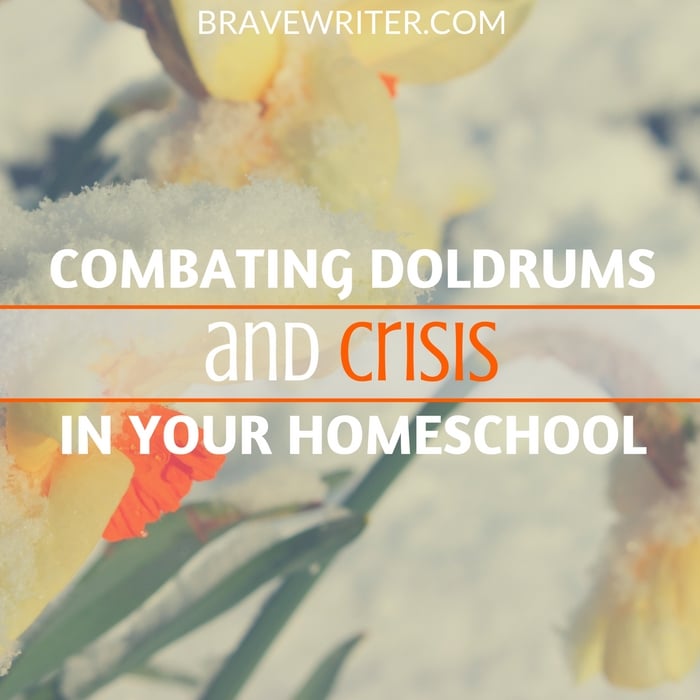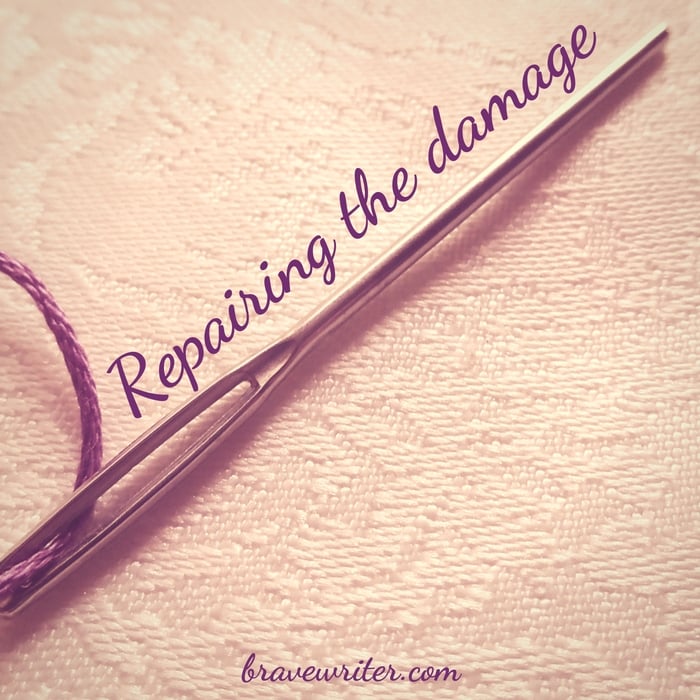
Yes, I feel it too. The bleak gray skies, the perennial low temps (unless you live in southern California where I hear it’s 75 degrees and balmy – shame on you!), the slow burn that comes from having gotten past new books and ideas but not yet in the home stretch where you can coast into summer… It’s winter and we’re mad as h-e-double-toothpicks and we wish we didn’t have to take it any more!
In my world, homeschool has had to persist in the middle of personal crisis. I’ve had emails this winter that report similar weariness: sick child, husband who lost a job, divorce, ailing parents. These common enough experiences impact homeschooling enormously. It’s not like you can keep up the imagination and energy for art, nature walks, creative writing assignments and math homework when your mind is racing through health insurance payment options or you’re sending out resumes for a new job!
For the rest of you who aren’t in the middle of crisis, you might be in the middle of the March muddle. Spring isn’t here yet and homeschool has lost it’s spark. When energy is low for whatever reason, try a crock pot approach to homeschooling. Here’s how to do it.
1) Strip your homeschool to bare essentials.
Now is not the time to beat yourself up about your lack of creativity. Rely on the routines that you can maintain with the least amount of preparation. In our house, that means we continue with math, reading and poetry teatimes. We also keep up with our writing. I tend to rely on interest-driven writing, I skip big projects that require revision and focus instead of personal writing (journaling, freewriting, silly writing prompts from one of my many word books laying around the house). We always keep teatimes going because they feel special, include yummy food and make the day seem nicer than it actually is.
2) Get help.
You can join a co-op, hire tutors, swap subjects with a friend (I did that one year – I taught English to the my friend’s daughter while she taught math to my son).
3) Be good to you.
This may not be your best season for home education. Accept that. Instead, take time each day to do something nice for yourself. You might enforce a quiet half hour (light a candle and tell your kids they can talk when you blow it out). Read a book during that half hour. Unplug computer and phone. Or give yourself permission to bone up on a subject to be taught later. Perhaps you have always wanted to do crafts with your kids, but it’s too much to prepare, plan and execute right now. Use this down time to read a little, clip a few ideas and file them. Don’t tackle the whole thing. Just tuck away a little bit of input for the future. It will help you remember that a more energetic time is on its way.
4) Television and movies aren’t the enemy.
You have my permission (in case you need it) to use the TV to help you cope. I swear, your children will turn out just fine. Choose some programs that make you feel like a better mother. Watch Discovery channel, the cooking channel, the Project Runways for fashion production. Watch people realize their dreams and ambitions or learn about history or science or run through as many Broadway musicals as you can. Watch Shakespeare movies or all the Disney films in chronological order. Turn the TV into a secret ally. Pop corn. Trust that immersion into the world of film or television for this season will yield great rewards. (I’ll write a post on that soon to help alleviate your anxiety, because television and film can be valuable to your kids.)
5) Take the long view.
You’re a good mom. How do I know? You homeschool. Only devoted parents (usually moms) take on this awesome task. Trust that what you’ve poured in will sustain your kids through this period of chaos, the depression, the pressure, or the distraction. Remember that anything missed now can be easily caught up in a more alive, less blues-y time.
I’m in a season just like this. It takes a lot of nurturing self-talk to not beat myself up for being less than on top of my game. One way I’ve coped is I stopped folding clothes. I just throw them in a pile and sort through them as needed. Sometimes giving up even one routine creates a little breathing room and for some reason, clothes folding is just too much right now.
I’ve also realized that this is a season to be close to my kids (in that more “along side them” way). So I sit on the couch and watch their sit-coms, I lay on their beds talking into the night, I page through clothing catalogs hearing about the spring fashion line, I make vegan food recipes with the new vegans in my family, or I joke around through Facebook chat with them (even while we’re sitting in the same room!). I have less energy for the prepared kind of learning, so I’m giving my time and heart and availability instead. I still do math each day with them. And I supervise writing. But I’m allowing their interests to dictate right now. They check out good stuff from the library, they have stuff they want to learn. So we’re going where they lead. I’m following along with money, time and heart (just not as much intention).
I hope you all are finding ways to get through this season.
Peace.






















